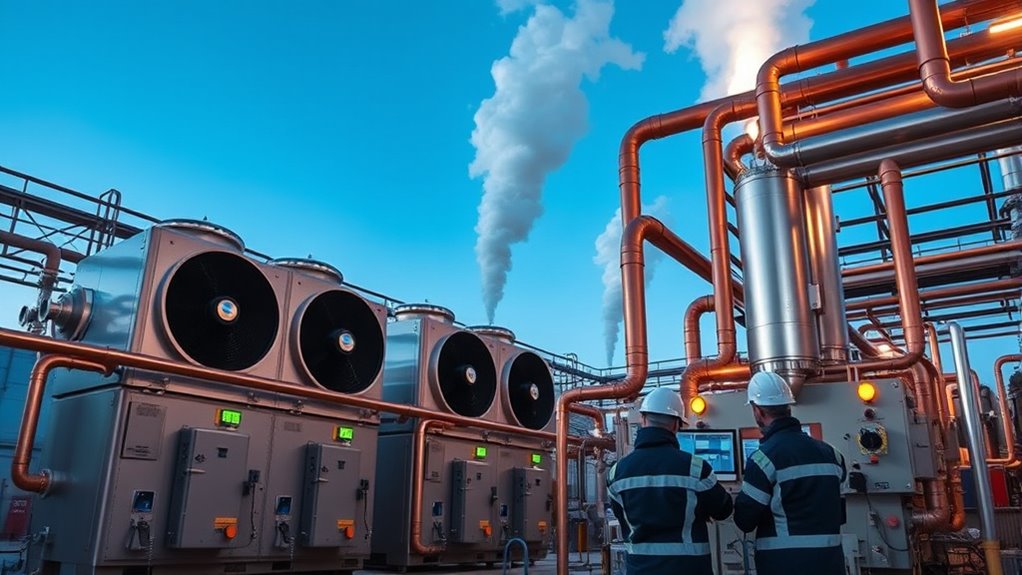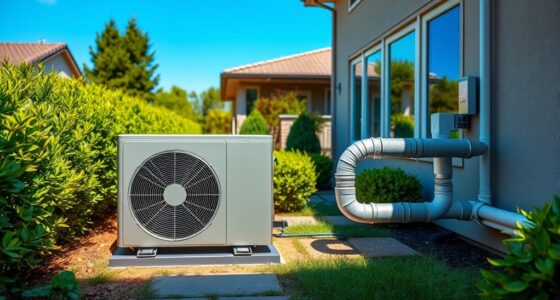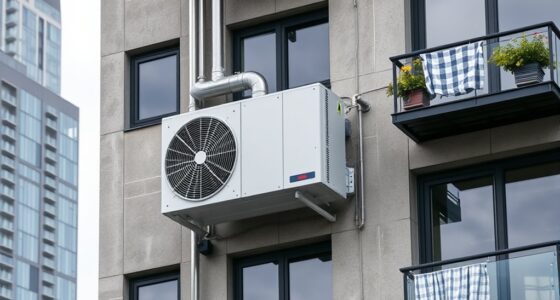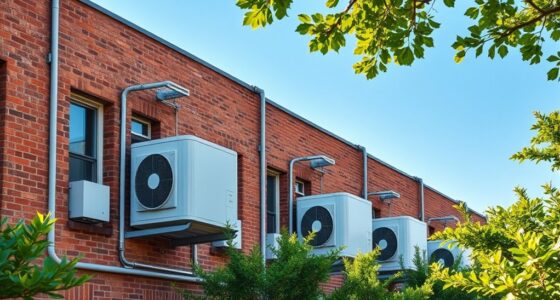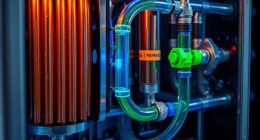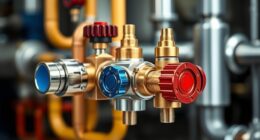Applying heat pumps in industrial process heating helps you cut energy costs and reduce emissions by efficiently transferring heat and capturing waste energy for reuse. They improve process stability, lower operational expenses, and support sustainability goals. Despite challenges like corrosion and equipment optimization, advances in technology now make integration more reliable and cost-effective. To discover how these innovations can benefit your operations, explore further insights into their practical applications and future trends.
Key Takeaways
- Heat pumps transfer heat efficiently from low to high-temperature processes, reducing energy consumption in industrial heating.
- Integration of heat pumps enables heat recovery, lowering operational costs and enhancing process sustainability.
- Proper corrosion management and component selection ensure reliable operation in harsh industrial environments.
- Combining heat pumps with renewable energy sources further decreases reliance on fossil fuels and reduces emissions.
- Advanced controls and innovative materials optimize performance, extending lifespan and maximizing energy savings in industrial applications.
Understanding the Role of Heat Pumps in Industrial Heating
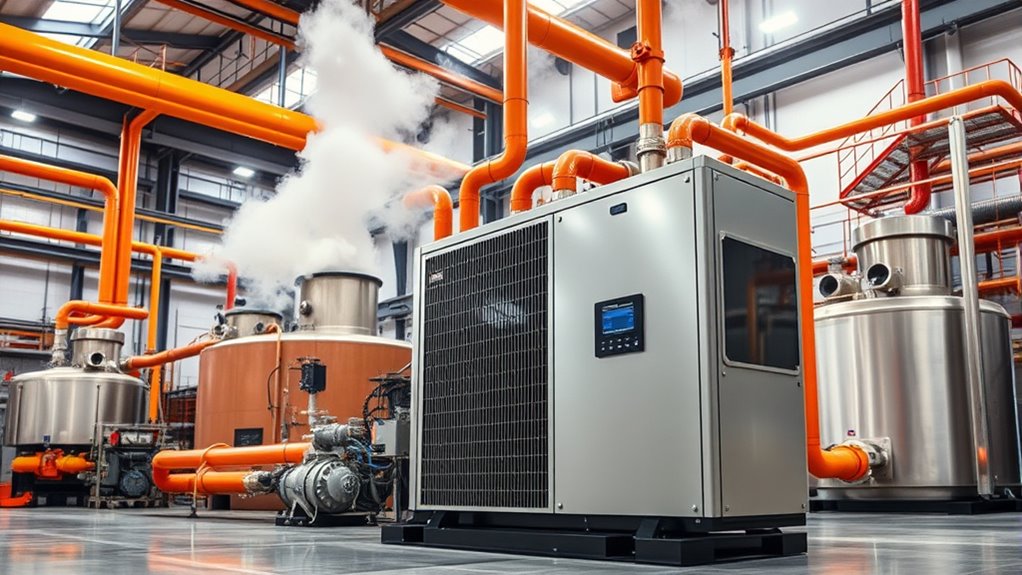
Heat pumps have become an increasingly important technology in industrial process heating because they efficiently transfer heat from a lower-temperature source to a higher-temperature application. This process substantially improves refrigeration efficiency by reducing energy consumption compared to traditional heating methods. You can also use heat pumps for energy storage, capturing excess heat during low-demand periods and releasing it when needed, which optimizes operational efficiency. With their ability to recycle heat, they lower greenhouse gas emissions and operating costs. Understanding this role helps you see how heat pumps can integrate seamlessly into your industrial systems, providing sustainable and cost-effective heating solutions. Their ability to enhance refrigeration efficiency and facilitate energy storage makes them essential tools for modernizing industrial heating processes. Understanding heat transfer processes is key to maximizing the benefits of heat pump technology in industrial applications.
Technological Challenges and Solutions for Industrial Heat Pump Integration
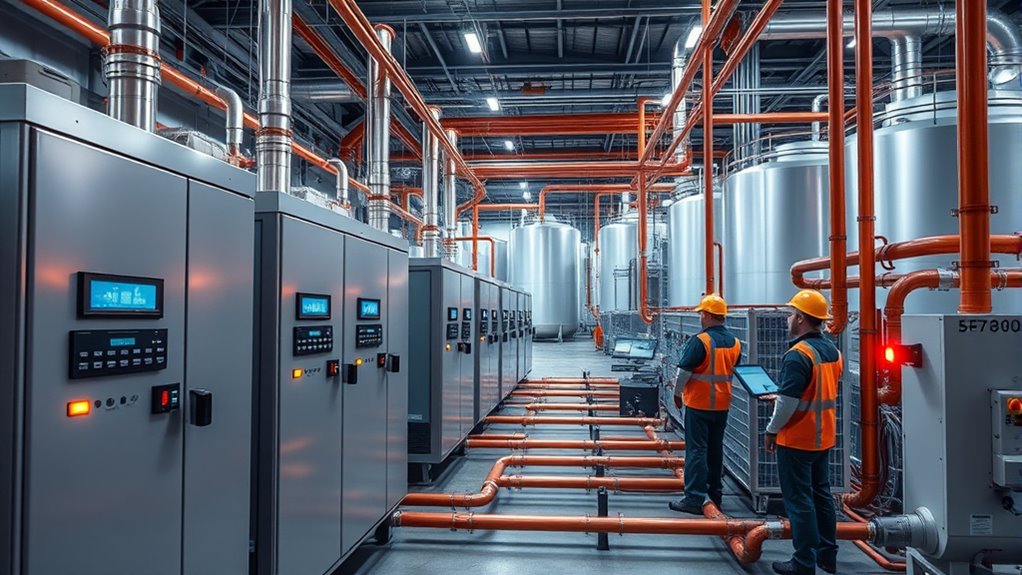
Integrating industrial heat pumps into existing systems presents several technological challenges that need careful consideration. One major issue is corrosion management; the harsh industrial environments and exposure to moisture can accelerate corrosion, risking equipment failure. Implementing proper materials, protective coatings, and maintenance routines can mitigate these risks. Another challenge involves optimizing compressor efficiency, as compressors are critical to overall performance. Inadequate efficiency leads to higher energy consumption and operational costs. Solutions include advanced compressor designs, variable speed drives, and precise control systems that adapt to fluctuating process demands. Additionally, selecting vetted components and materials proven for durability in industrial environments further enhances system reliability. Balancing these technical aspects ensures reliable operation and maximizes energy savings. Addressing corrosion and maintaining compressor efficiency are essential steps toward successful integration of heat pumps in industrial settings.
Key Benefits of Implementing Heat Pumps in Manufacturing Processes
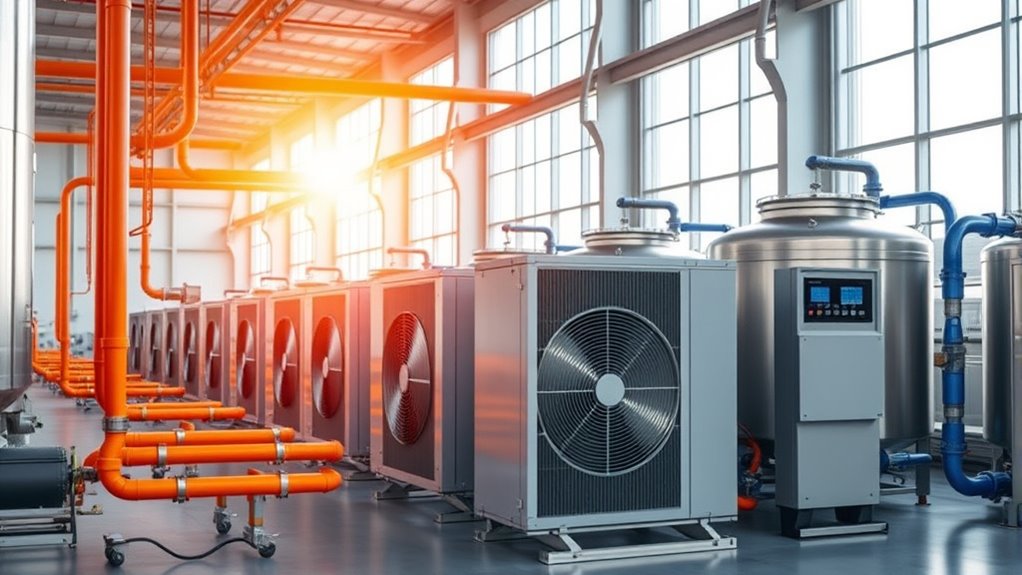
Implementing heat pumps in manufacturing processes offers significant energy efficiency benefits that can directly reduce operational costs. By optimizing heat transfer, you lower energy consumption and enhance overall process efficiency. This leads to substantial cost savings over time, boosting your competitiveness. Additionally, heat pumps help reduce environmental impact by decreasing greenhouse gas emissions and reliance on fossil fuels. The switch to heat pumps can also improve process stability and reliability, ensuring smoother operations. Plus, the versatility of heat pumps allows you to adapt to various manufacturing needs, making them a flexible solution. Ensuring proper system sizing is crucial for maximizing efficiency and performance. Overall, investing in heat pumps helps you save money while supporting sustainability goals, turning environmental responsibility into a tangible business advantage.
Practical Applications and Case Studies in Industry
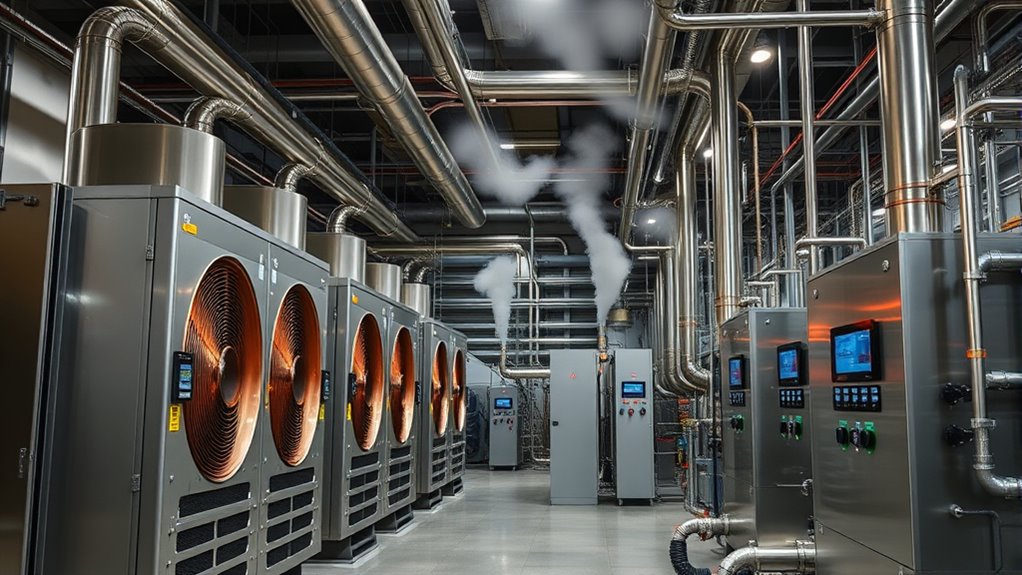
Real-world applications of heat pump technology demonstrate how manufacturing plants can achieve tangible energy savings and operational improvements. For example, case studies reveal significant reductions in energy costs through efficient heat recovery and renewable heat sources. When performing a cost analysis, companies find that initial investments are offset by lower utility bills and maintenance expenses over time. Additionally, adopting heat pumps enhances environmental impact by decreasing greenhouse gas emissions compared to traditional heating methods. Industries such as food processing, chemical manufacturing, and textile production have successfully integrated heat pumps, improving process efficiency while meeting sustainability goals. These practical examples highlight how leveraging heat pump technology not only drives economic benefits but also supports corporate responsibility by minimizing environmental footprints. Incorporating energy-efficient systems further amplifies these benefits, ensuring long-term operational sustainability.
Future Trends and Innovations in Industrial Heat Pump Technology
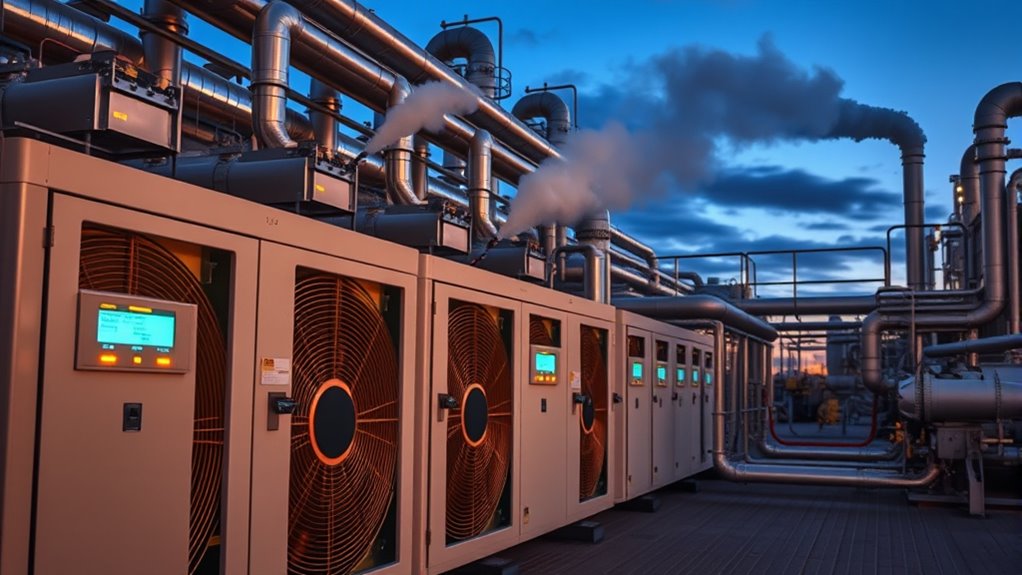
As industrial heat pump technology evolves, innovative trends are shaping a more efficient and sustainable future. You can expect advancements focused on integrating renewable energy sources seamlessly, reducing reliance on fossil fuels. Improvements in compressor efficiency are driving higher performance while lowering energy consumption, making systems more cost-effective. Future developments include smarter controls and adaptive systems that optimize operation based on real-time data. Additionally, new materials and design innovations will enhance durability and performance in demanding industrial environments. These trends aim to maximize energy savings and minimize environmental impact, helping industries meet sustainability goals. The integration of emerging technologies will further enhance system capabilities and foster innovation in industrial heat pump applications. By embracing these innovations, you’ll stay ahead in implementing cutting-edge, eco-friendly heat pump solutions that align with the shift toward renewable energy and increased efficiency.
Frequently Asked Questions
What Are the Initial Costs of Installing Industrial Heat Pumps?
When considering installation costs, you’ll find that upfront investment in industrial heat pumps varies based on size, capacity, and complexity. Typically, the initial costs include equipment purchase, installation, and system integration. While these costs can be higher than traditional heating methods initially, you often save money long-term through energy efficiency. It’s important to evaluate these upfront investments carefully, as they impact your overall operational expenses and return on investment.
How Do Heat Pumps Compare to Traditional Fossil Fuel Heating Methods?
When comparing heat pumps to traditional fossil fuel heating methods, you’ll find heat pumps offer higher energy efficiency and better support renewable integration. They use electricity, which can come from renewable sources, reducing your carbon footprint. While initial costs might be higher, their lower operating costs and environmental benefits make them a smarter, more sustainable choice long-term. This shift helps you align with greener energy goals and cut ongoing expenses.
Are There Specific Industries That Benefit Most From Heat Pump Integration?
You’ll find that agricultural processing and chemical manufacturing benefit most from heat pump integration. These industries often require consistent, efficient heating, which heat pumps provide by reducing energy costs and emissions. You can improve process efficiency, meet sustainability goals, and lower operational expenses. By adopting heat pumps, you’ll gain a reliable, eco-friendly solution that enhances productivity and aligns with modern energy standards.
What Maintenance Requirements Do Industrial Heat Pumps Typically Have?
Think of your heat pump as a finely tuned instrument that needs regular care. You’ll need to monitor refrigerant levels, prevent corrosion, and make certain proper refrigerant management. Routine inspections are key, checking for leaks and corrosion to keep it running efficiently. Proper maintenance saves energy and extends your equipment’s life, much like tending a garden. Stay proactive, and your industrial heat pump will perform reliably, boosting your processes without unexpected downtime.
How Do Regulations Impact the Adoption of Heat Pumps in Industry?
Regulations substantially influence your decision to adopt heat pumps in industry. You need to ensure regulatory compliance with environmental standards, which can either encourage or restrict usage. Policy incentives, like tax credits or grants, make heat pumps more affordable, motivating you to implement them. Staying informed about evolving regulations helps you plan investments wisely, maximizing benefits from incentives while adhering to legal requirements.
Conclusion
As you explore heat pumps for industrial heating, you might find that their potential extends beyond just energy savings. Sometimes, a simple upgrade can unexpectedly transform your entire process, boosting efficiency and sustainability. Keep an eye on emerging innovations—they could be the game-changer you didn’t see coming. Embracing these technologies now might just be the coincidence you need to stay ahead in manufacturing’s evolving landscape. Your next breakthrough could be closer than you think.
